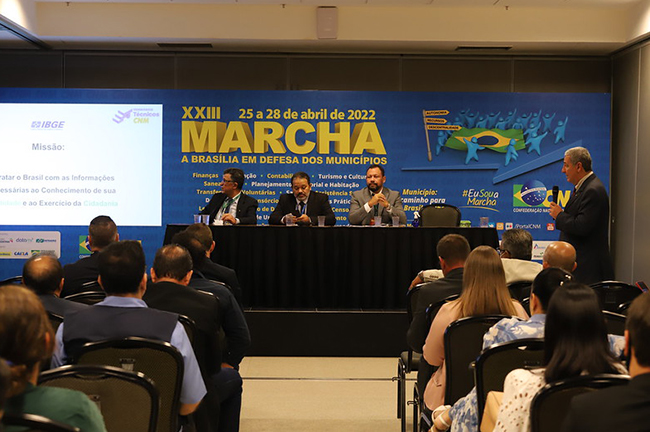2022 Census
Panel reinforces importance of municipal support for the 2022 Census
April 29, 2022 11h00 AM | Last Updated: May 02, 2022 05h35 PM
More than support, the IBGE considers authority engagement essential for the preparation of the 2022 Population Census, whose data collection will start on August 1st. This was the main message conveyed by participants in the panel “The importance of the 2022 Census and how to monitor it”, held on the 27, as part of the XXIII March in Favor of Municipalities, promoted by the National Confederation of Municipalities (CMN). The event, in the International Convention Center of Brazil, ended yesterday (28) and was attended by more than 3 thousand mayors from all over the country.
The one-and-a half-hour presentation was shared between David Montero, assistant for the Operational Department of Censuses; Wolney Menezes, coordinator of the National Address List for Statistical Purposes (CNEFE); and Cláudio Barbosa, operational coordinator for the Census. The opening session was presented by Hilton Leal, economist from CMN, who highlighted the relevance of the population data surveyed by the IBGE in the sharing of resources between municipalities.

"The data collected by the Census interfere with the Municipal Participation Fund (FPM), a coefficient based on the population distribution,” says Mr. Leal, as he explains that the Census is the only source of information that provides public-policy administrators with a diagnosis of each municipality. "Without an x-ray view of the moment, it is impossible to plan the future, and that is done by means of the Census. So, we ask municipal administrators to encourage residents to welcome the enumerators."
Then, Mr. Montero presented a summary of the census operation in the form of graphs and figures, to an audience mostly formed by mayors and municipal secretariats. He mentioned the different realities found by the enumerators in census sectors and that the use of technological tools made available by the Institute help in the data collection work, which can be monitored almost in real time. "The technology used allows the enumerator to visit the housing unit and fill out the questionnaire, which will be sent online. That gives city government the opportunity to see how many questionnaires have been administered in the location and monitor the enumerator’s work.

Coordinator Wolney Menezes detailed the Population Census phases and explained about the best occasions for municipal administrations to help the IBGE. "There is a moment before, during and after the Census and there are always opportunities to get help and receive information from the municipalities."
He also spoke about the importance of making uniform, in the city administration, information from the National Address List for Statistical Purposes (CNEFE), a nationwide address repository created in 2005, based on data collected by the 2000 Census. CNEFE presents information about housing units and establishments from all over the country. It is updated at every new enumeration, and goes through a continuous process of isolated updates according to the demand from other surveys.

In the end, the operational coordinator for the Census, Claudio Barbosa, summarized the data collected by the enumerator and took the opportunity to speak about the characteristics of many cities represented by their mayors and assistants. Mr. Barbosa used data from Cities@ Portal, the IBGE channel that gathers information about Brazilian municipalities and states.
The event was also attended by Heal of IBGE State Branches, IBGE directors Cimar Azeredo (Surveys) and Cláudio Stenner (Geoscineces), who were available to answer questions asked after the lecture, a moment that reinforced the atmosphere of partnership between the Institute and municipal administrators.

















